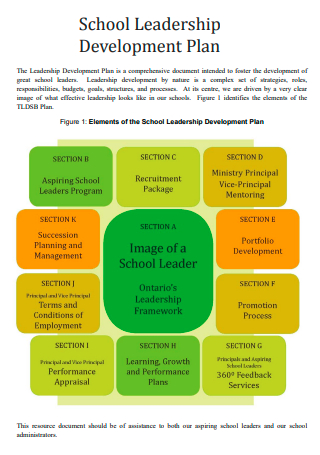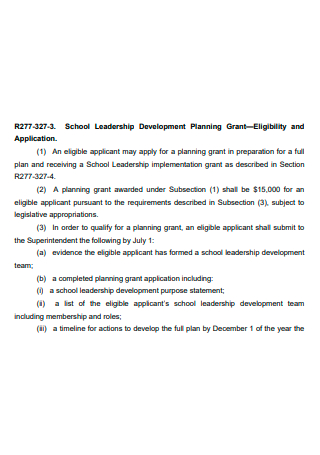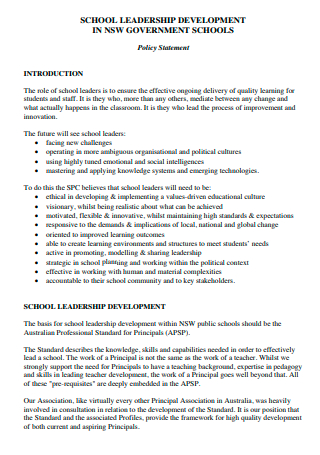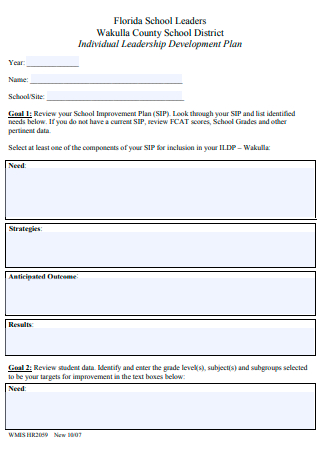5+ Sample School Leadership Development Plan
-

School Leadership Development Plan Template
download now -

School District Leadership Development Plan
download now -

School Leadership Development Plan For Licensure
download now -

School Leadership Development Planning
download now -

School Leadership Development Plan Example
download now -

School District Individual Leadership Development Plan
download now
FREE School Leadership Development Plan s to Download
5+ Sample School Leadership Development Plan
What Is a School Leadership Development Plan?
What Is School Leadership?
What Is the Image of a School Leader?
What Are the Stages School Leaders Go Through?
How Does the Program Administration in School Leadership Works?
How to Make a School Leadership Development Plan?
FAQs
What Makes an Effective School Leader?
How Can Schools Improve Leadership?
Why Is It Important to Have Leadership Skills?
School Leadership Development Plan is the basic stage prior to any decision of starting this program. This needs an intensive study and research for an effective result. Continue reading below to know more.
What Is a School Leadership Development Plan?
A School Leadership Development Plan is a comprehensive document intended to foster the development of great school leaders. Leadership development by nature is a complex set of strategies, roles responsibilities, budget, goals, structures, and processes. School leadership is second only to classroom teaching as an influence on pupil learning. Almost all successful leaders draw on the same repertoire of basic leadership practices. The ways in which leaders apply these basic leadership practices – not the practices themselves – demonstrate responsiveness to, rather than dictation by, the contexts in which they work. School leaders improve teaching and learning indirectly and most powerfully through their influence on staff motivation, commitment and working conditions. School leadership has a greater influence on schools and student when it is widely distributed. Some patterns of distribution are more effective than others; and small handful of personal traits explain a high proportion of the variation in leadership effectiveness.
These strong claims about successful school leadership, therefore, serve to guide the development of a School Leadership Development Plan which is intended to develop and maintain a cadre of exemplary school leaders for today and tomorrow.
What Is School Leadership?
Successful school and system leadership is responsive to the diverse nature of communities. The competencies and practices in the frameworks describe leadership broadly in a way that is intended to be inclusive of the diversity found in schools and communities across the province. Their application will be shaped and informed by the community context. Moreover, as instructional leaders, principals and supervisory officers embed direct involvement in instruction in their daily work through team work with all staff focused on improved school and classroom practices.
As leaders who are committed to equity of outcome, they help to make sure inclusive and instructionally effective learning environments that increase the likelihood that all students will be successful learners.
In addition, school and system leaders carry out these specific aspects of their role using a growth-oriented and collaborative approach all the domains of the frameworks. Practices and competencies evolve as leaders move through various career stages, specialized assignments, and unique educational environments. The school ad system leaders expand and strengthen their repertoire of practices, skills, knowledge, and attitudes over time, provided they have opportunities to grow and are supported by school boards that are committed to leadership development.
What Is the Image of a School Leader?
As set out in the following, the Program is formalized for newly appointed school leaders. However, it is a significant element of the program offering for Aspiring School Leaders.
Mentoring or Coaching
The Mentoring or Coaching Program is an integral component of the Leadership Development Plan. Mentoring includes coaching and is one of the most powerful forms of professional learning. It takes place through a collaborative, ongoing, reciprocal learning relationship between an experienced school leader (mentor) and a newly appointed school leader (mentee). It is focused on essential aspects of the new leadership role. Mentoring is non-supervisory and is based on trust, respect and confidentiality. It includes job-embedded learning and enables mentors and mentees to connect in a planned and purposeful manner. As mentors, we are passing on/sharing our wisdom, experience and expertise. As coaches, we are eliciting the strengths, wisdom and solutions from the client.
The mentor will be responsible for the following:
- Listen effectively, provide constructive feedback and provide moral support to the protégé.
- Reflect along with the protégé on shared readings and provide the protégé with other appropriate resources.
- Model for the mentee behaviors and attitudes congruent with the Board’s vision of school leadership.
On the other hand, the mentee will:
- Indicate a high degree of satisfaction that the mentor has been an effective and collaborative partner.
- The mentee will be able to demonstrate enthusiasm for continual professional learning.
- Be able to articulate and support the Board’s vision of school leadership.
- Have identified areas for growth through self?assessments and ongoing reflections of their personal competencies.
- Have produced growth and performance plans in accordance with Ministry and Board guidelines.
- Have accepted suggestions for their plans from their mentor when necessary.
- Show confidence as a result of having tried new strategies or having acted on the advice of their Mentor.
- Constructive feedback given by the mentor will have assisted mentee in making modifications to their actions.
- Demonstrate new or refined skills in areas identified on growth plans.
- Have a portfolio that documents their experience.
Moreover, the board will:
- Support a process for succession planning. A comprehensive and effective mentoring program will have been implemented.
- Senior administration will have visibly promoted and, where appropriate, participated in the mentoring program.
- New mentees and mentors will be identified.
- Provide effective and ongoing professional development opportunities for its leaders.
- Funding and resources will be provided to support the mentoring program and other professional development activities.
- An ongoing interest in leadership development and a desire to be involved in the mentorship program will be evident.
- Recognize improved student learning by developing effective leaders.
- Effective leadership from participants in the mentorship program will be demonstrated in schools. This will be evident in excellent teaching practices, improved student learning, and positive school community morale.
Accountability
Leaders are no longer individual contributors and will be not be assessed that way. The most successful leaders know that their success hinges more on their team’s performance than their own. They are held accountable for others’ actions and results, as well as their own, and must take accountability for team outcomes – the good and the bad. By training leaders on this important distinction, you can ensure that they will be capable of defining accountabilities and rigorously holding direct reports to those commitments, so that everyone can succeed and produce the results they need.
Change Management
Changes in the leadership, mentee turnover, growth and countless other factors contribute to ongoing changes. An organization is not a static entity that can be frozen in time. Whether the changes feel like a ripple or a tidal wave to mentees, leaders must be prepared to shepherd them through the changes, which requires training leaders to manage change before it ever even happens. Change management training should be part of any school leadership development plan to make sure that leaders can harness the power of vision, provide strong leadership during any season and capitalize on the transitional times to improve performance.
Great Influence and Negotiation
Effective leaders do not command with authority; they inspire, persuade and encourage others to make their vision a reality. By learning how to be strong influencers and fair negotiators, leaders will return to their roles knowing that it is not about who has the most power but about who has the best influence on mentees to achieve results. Rather than demanding that mentees do something because of authority or hierarchy, leaders will use this subtle quality to build relationships, align priorities, and find a win-win that ultimately leads to completed projects and delivered results.
Good In Communication
Communication training is often a cornerstone of school leadership development, but how effective and up-to-date is it? Communication is not a skill that leaders can learn by just reading, watching a video or listening to a presentation about it. In a leadership role, communication happens at all hours of the day through large presentations, one-on-one conversations, phone calls, text messages, videoconferencing and, of course, emails.
What Are the Stages School Leaders Go Through?
There are a few lists on how the standard about mentoring and coaching school leaders is conducted. Here are the following stages:
Mentors attend training.
Mentors make contact with assigned mentee.
First meeting:
- Getting acquainted
- Discussion of the program
- Review logistics of the partnership, including electronic and face-to-face meetings
- Review accountability requirements of the partnership
- Assessment of Learning Needs
- Preparation of Learning Plan
Subsequent Meetings:
- Review Learning Plan – discuss
- Review Mentee learning needs – modify plan
- Client Driven Discussions
Following Meetings and Contacts:
- Mentor-Mentor activities
- Mentor maintains activity log
- Mentor maintains reflective journal
- Learning Plan prepared
Conclusion:
- Closure activities
How Does the Program Administration in School Leadership Works?
The school leadership program administration is composed of many officers and roles. Here are the roles and responsibilities per member:
How to Make a School Leadership Development Plan?
Below, you will find a simple process to teach you how to create a leadership-development plan.
Step 1: Write Down Your Initial Development Goals
Jot down some thoughts on why you want to create a leadership-development plan. You might be writing a plan at the beginning of your leadership career to ready yourself for higher-level roles.
Step 2: Study the Traits of Great Leaders
The next step in writing a leadership-development plan is to get inspired by the traits and qualities of great leaders. Write out a list of your favorite great leaders. Then, write the main leadership qualities that each one displayed. Finally, compile all the abilities, qualities, and competencies of these leaders into one list.
Step 3: Assess Your Own Personality and Traits
Even though personality assessments can seem imprecise, this step is important. The answers you find can help you personalize your development plan for you and your true temperament instead of for a leader, generally. It can help you make a plan that you’re genuinely interested in, which can make the difference between a plan you actually use and one you do not.
Step 4: Write Down Your Top Values
Your top values are another aspect of your particular leadership style that you need to put on paper. This is important because leadership traits are defined in slightly different ways by people with different values. Also, your values determine the way you will express those traits, as well as the goals you’ll work toward.
Step 5: Check Your Self-Perception Against Others’ Opinions
After completing your self-assessment, you might think you have discovered bedrock truth (and this may be true). However, it is vital to gather some opinions about yourself from others who know you well.
Step 6: Prepare a Personal Vision Statement
Combine your insights from previous steps and turn them into a personal vision statement. This statement will concisely sum up what you’ve learned about yourself and remind you of your purpose.
FAQs
What Makes an Effective School Leader?
Effective leaders are dedicated, well-prepared individuals who know how to create vision, share authority and are ultimately held accountable for their school’s success. Good leadership is about cultivating a shared vision and building a strong leadership team.
How Can Schools Improve Leadership?
For schools to improve leadership, school leaders need to play a more active role in instructional leadership by monitoring and evaluating teacher performance; conducting and arranging for mentoring and coaching; planning teacher professional development; and orchestrating teamwork and collaborative learning.
Why Is It Important to Have Leadership Skills?
They are important skills to have because a good leader is able to bring out the best abilities in his or her team members and motivate them to work together in achieving a shared goal. A good leader is also well-organized and keeps the team on track and focused to avoid delays.
A school leadership development plan is a detailed layout of the professional development and learning activities one is going to engage in during a certain period of time. Its goal is to improve leadership abilities. It is important that a school leadership development plan be well-written, which can take effort, structured thinking, and collaboration. Only a well-thought-out plan will be effective for actual change. If you’ve written it right and keep it in a place where you’ll see it often, you’ll be more motivated to use it.
